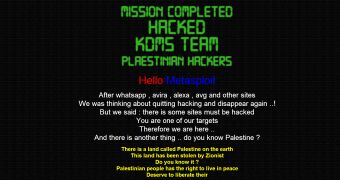Over the past week, we’ve seen a lot of website defacements as a result of DNS hijacking. Two hacker teams stood out.
Pakistani hackers of Team Madleets have defaced a couple of Google Malaysia domains via DNS poisoning. Malaysian registrar MYNIC has published a statement to clarify the fact that the hackers pulled off the attack by exploiting a reseller account.
Previously, the same group defaced several high-profile domains from Suriname, Antigua and Barbuda, and Saint Lucia.
The list includes audi.sr, blackberry.sr, AVG.sr, bing.sr, microsoft.sr, mastercard.sr, intel.sr, microsoftwindows.sr, msn.sr, philips.sr, samsung.com.ag, orange.com.ag, cola.ag, oracle.co.ag, ibm.ag, canon.ag, clarion.ag, fujitsu.ag, hitachi.ag, toshiba.ag, bmw.lc, toshiba.lc, hitachi.lc and honda.lc.
In September, the same team targeted Google Kenya and Google Burundi.
KDMS Team has also leveraged DNS hijacking to deface some high-profile domains. The list includes the websites of LeaseWeb, AVG, Avira, WhatsApp, Metasploit and Rapid7.
According to Avast, their website was also targeted, but the company was vigilant and managed to contain the attack before any damage was caused.
The DNS records of Avira, AVG and WhatsApp websites were altered after the hackers breached the systems of Network Solutions. In the case of Rapid7, the attackers sent a fax with a spoofed change request to Register.com. Both Register.com and Network Solutions are owned by Web.com.
KDMS Team is a pro-Palestinian group whose members are trying to raise awareness of the situation in Palestine.
As far as the arrest of Paunch is concerned, first rumors of the alleged BlackHole exploit kit creator’s arrest surfaced on Monday. Later, Europol confirmed that Russian authorities detained a high-profile cybercriminal.
Security experts immediately noticed the effects of the arrest. F-Secure says the BlackHole and Cool exploits kits developed by Paunch are no longer getting updates and cybercriminals have stopped using them.
Here are some other interesting stories, in case you’ve missed them:
Security researcher rewarded for finding vulnerability in Gmail for iOS
Expert says hackers can decrypt WhatsApp messages
LulzSec hackers from Ireland will not go to jail
Latvia’s State Employment Agency hacked by Anonymous
Latvian accused of creating Gozi virus released from jail
LulzSec Peru leaks files allegedly stolen from Venezuelan Army

 14 DAY TRIAL //
14 DAY TRIAL //